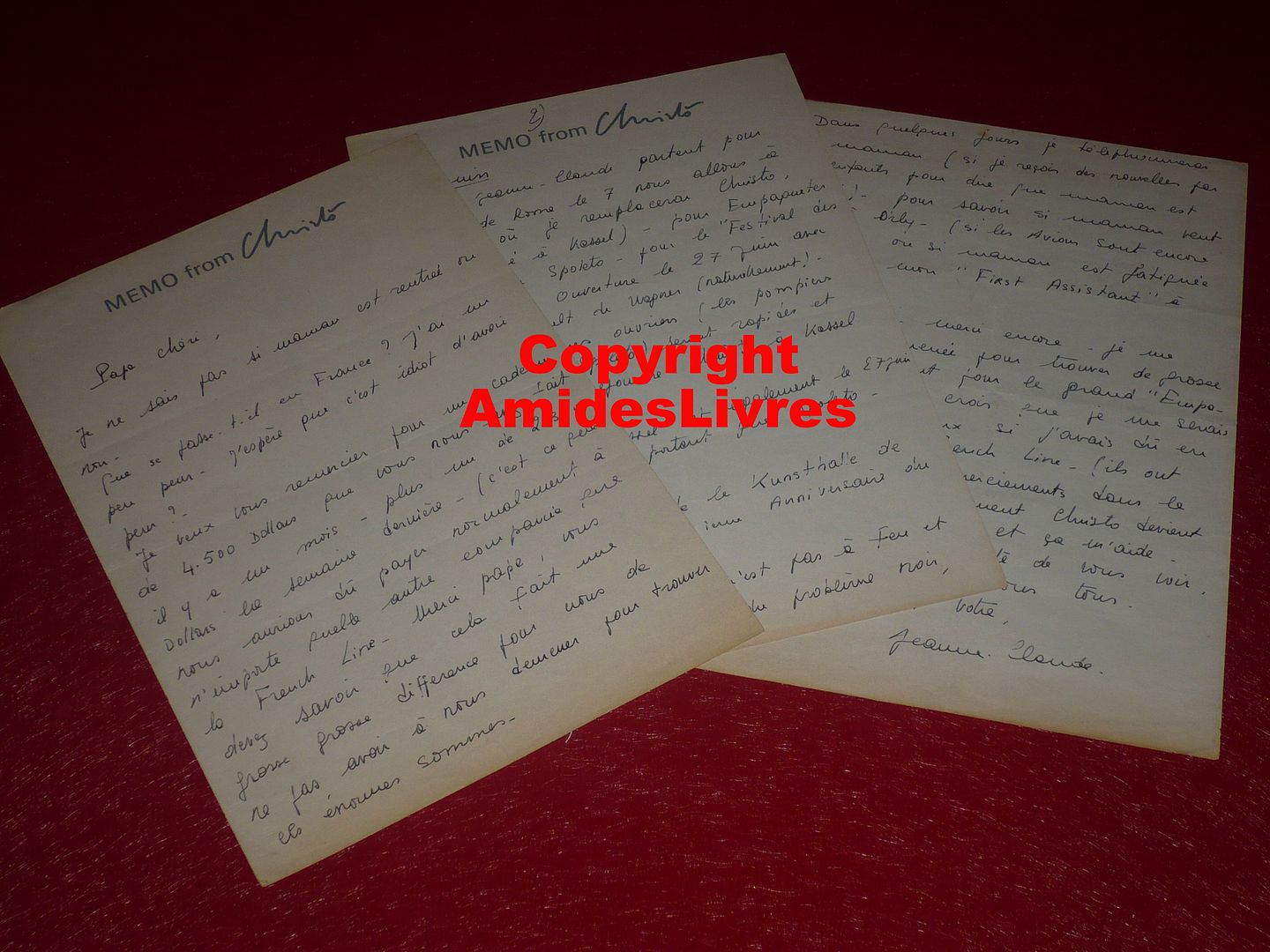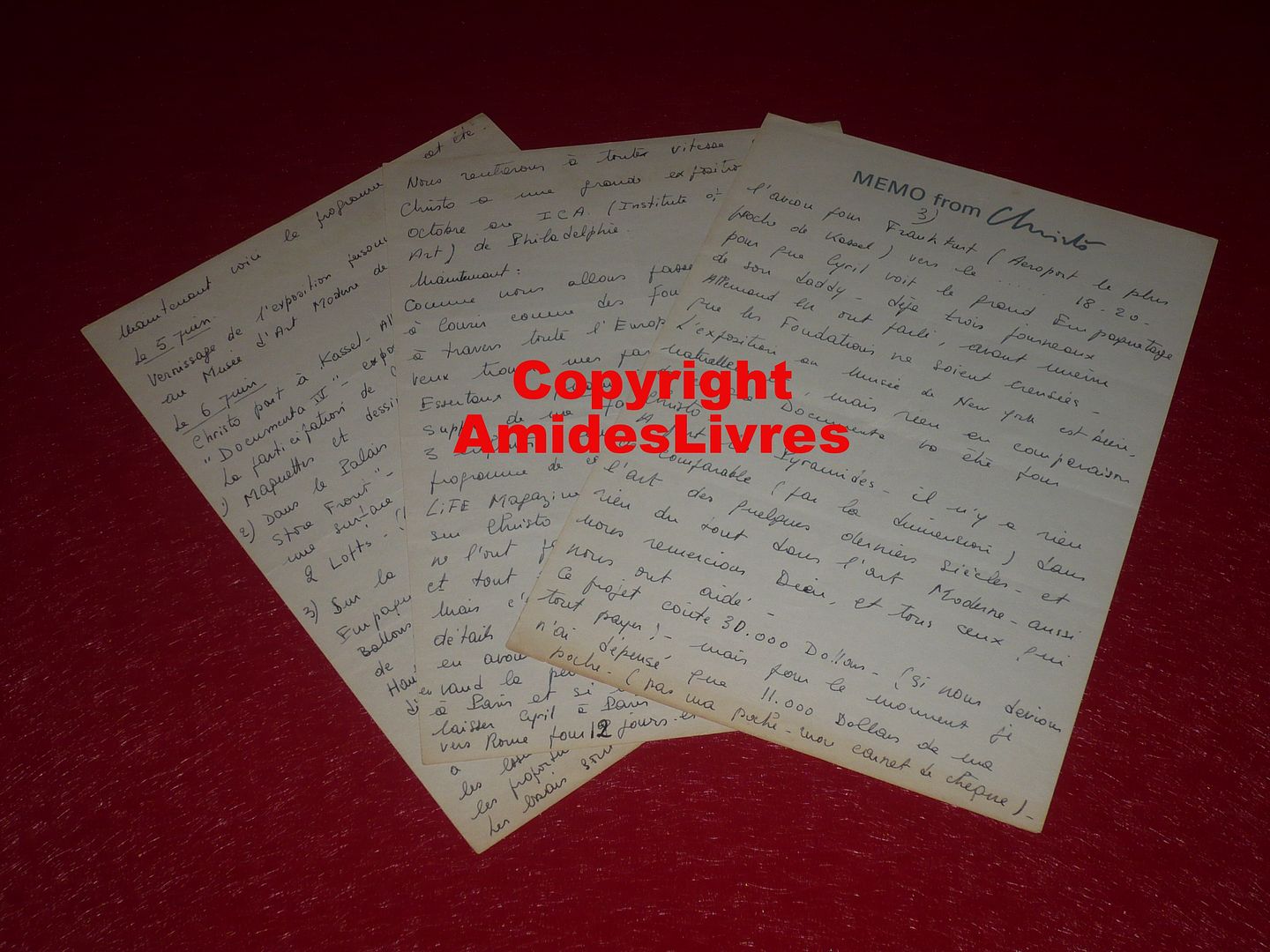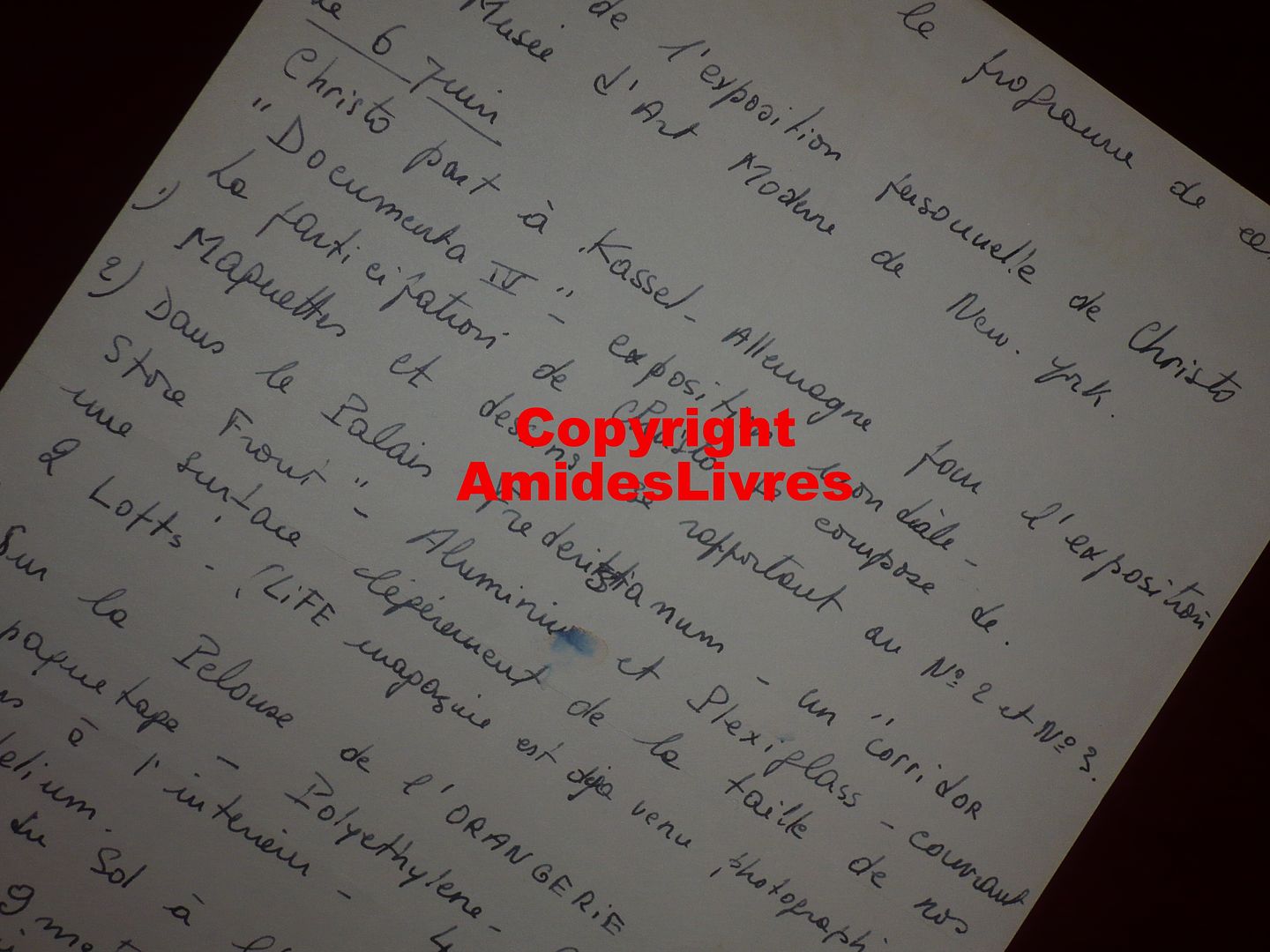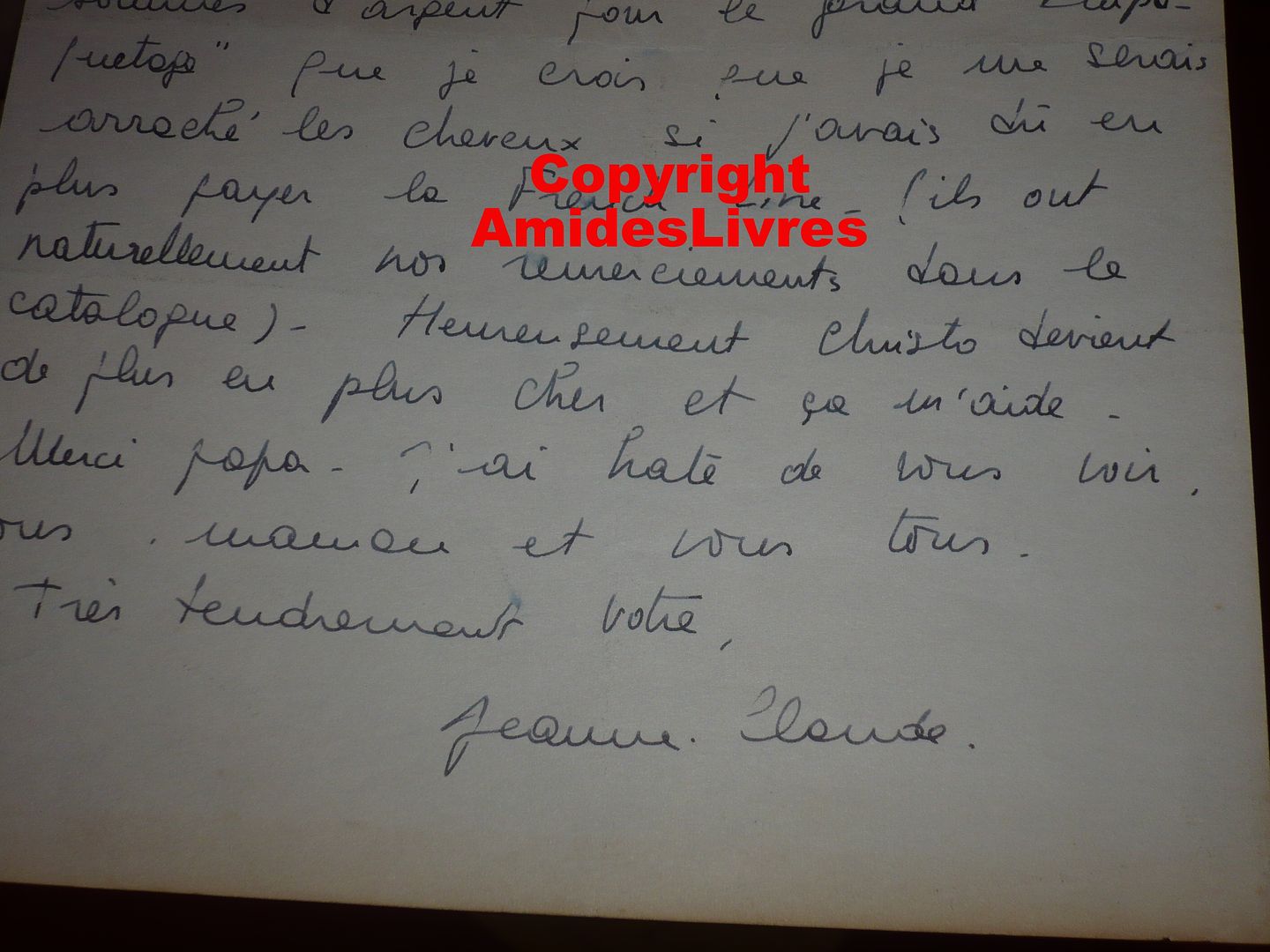[JEANNE CLAUDE / CHRISTO]
"Family Album".-18
-
Original Handwritten Letter signed
of
Jeanne-Claude
(1935-2009)
to his Father, General Jacques de Guillebon
May 1968
6 Pages entirely written by the artist's hand,
signed letter, on printed letterhead (“Memo from Christo”)
3 double-sided sheets, size approximately 25.5x18cm
Very very interesting letter, undated,
but which according to the content must be of May 1968
In this letter, Jeanne-Claude announces to her father the heavily loaded artistic program for the month of June and future projects:
various trips to Europe (their son Cyril included), exhibitions (including the famous Documenta IV, so important for the future...), but also exhibitions at MOMA, Orangerie, Spoleto, Kunsthalle de Bern, etc..
She mentions the financing difficulties due to the gigantism of the works presented,
as well as the success and international artistic recognition of Christo, which is coming more and more clearly...
_
Very important document!!!
Rare and Precious,
of an improbable encounter....
"Family Album".-18
-
Original Handwritten Letter signed
of
Jeanne-Claude
(1935-2009)
to his Father, General Jacques de Guillebon
May 1968
6 Pages entirely written by the artist's hand,
signed letter, on printed letterhead (“Memo from Christo”)
3 double-sided sheets, size approximately 25.5x18cm
Very very interesting letter, undated,
but which according to the content must be of May 1968
In this letter, Jeanne-Claude announces to her father the heavily loaded artistic program for the month of June and future projects:
various trips to Europe (their son Cyril included), exhibitions (including the famous Documenta IV, so important for the future...), but also exhibitions at MOMA, Orangerie, Spoleto, Kunsthalle de Bern, etc..
She mentions the financing difficulties due to the gigantism of the works presented,
as well as the success and international artistic recognition of Christo, which is coming more and more clearly...
_
Very important document!!!
Rare and Precious,
of an improbable encounter....
-
Chronological and biographical landmarks
Christo and Jeanne-Claude,
commonly Christo, is the artist name under which the common work of
Christo Vladimiroff Javacheff, born June 13, 1935 in Gabrovo, Bulgaria, and Jeanne-Claude Denat de Guillebon, also born June 13, 1935 in Casablanca, Morocco and died November 18, 2009 in New York.
This couple of contemporary artists (“who package geography and history”) became famous for their packaged objects. Naturalized Americans, they lived in New York in the SoHo district.
Chronological and biographical landmarks
Christo and Jeanne-Claude,
commonly Christo, is the artist name under which the common work of
Christo Vladimiroff Javacheff, born June 13, 1935 in Gabrovo, Bulgaria, and Jeanne-Claude Denat de Guillebon, also born June 13, 1935 in Casablanca, Morocco and died November 18, 2009 in New York.
This couple of contemporary artists (“who package geography and history”) became famous for their packaged objects. Naturalized Americans, they lived in New York in the SoHo district.
Christo Javacheff was born in Gabrovo, Bulgaria on June 13, 1935.
He calls himself a Macedonian Bulgarian of Czech origin. His father owned a chemical factory and his mother was general secretary of the Academy of Fine Arts in Sofia until 1931. His mother had fled Macedonia in 1913. Christo's family served extensively as a refuge for artists and friends fleeing the Allied bombing of cities. Christo's childhood memories also include the bodies of partisans executed in the streets and the entry of the Red Army into Bulgaria in 1944. Christo's father was harassed and imprisoned by the new communist regime for "sabotage." We can therefore say that Christo's childhood was quite harsh and that it surely had a significant impact on the artist. Very early on he had contact with art. At the age of 6, he made portraits of many women in the village. In 1953 he began his artistic training at the Sofia Fine Arts School where he studied painting, sculpture and architecture until 1956. He is charged, by the powers in power, with developing the surroundings of the Orient-Express train to give Western passengers a cheerful image of Bulgaria. However, due to the regime's strong propaganda, only true supporters of the Communist Party could access the diploma, which Christo was not. Indeed, Christo challenged the system by painting paintings that went against the ideology (like resting peasants). He therefore had some problems with Socialist Realism which was the norm and which imposed a Marxist-Leninist treatment of subjects as well as style. In 1956 he decided to flee to Vienna.
Then he moved to Paris in 1958.
To make a living he made oil portraits which he signed with his name "Javacheff". It was while delivering the portrait of the wife of General Jacques de Guillebon, director of the École Polytechnique, that he met their daughter Jeanne-Claude.
In 1963, he rubbed shoulders with the group of new realists.
His first works are abstract paintings and packaging of objects (bottles, cans, boxes, tables, etc.) or living models in canvas or plastic.
Jeanne-Claude Denat de Guillebon is French.
She was born in Casablanca, Morocco on June 13, 1935 — she and Christo would have been born on the same day at the same time.
She passed her baccalaureate in philosophy in 1952 in Tunis.
They met in 1958, the year which marks the beginning of their artistic collaboration.
Christo is rather the artist, and Jeanne-Claude the organizer: “The creations intended for the outside world are signed
by Christo and Jeanne-Claude, drawings by Christo”.
After emigrating to the United States in 1964 and settling in New York, they began to carry out large-scale projects, intervening directly and ephemerally on buildings, monuments or entire landscapes.
Jeanne-Claude died in November 2009, in New York, following a ruptured aneurysm.
-
Precilda Fechheimer, mother of Jeanne-Claude:
Marriages with Léon Denat, and on 10.01.1947 with Jacques de Guillebon (1909-1985)
Child from 1st marriage: Jeanne-Claude 06/13/1935
Children from the 2nd marriage: Joyce-May de Guillebon,
Norbert, Count of Guillebon & Alexandra de Guillebon
-
Jacques de Guillebon (born October 13, 1909 in Lunéville - died February 25, 1985 in Paris) whom Jeanne-Claude calls "Papa"
is a French general, Companion of the Liberation.
A former student of the École Polytechnique (X1930), he was sent to the French Somali Coast in 1935, then to the Senegalese Tirailleurs Regiment of Chad in French Equatorial Africa in May 1939.
After the Appeal of June 18, then captain, he participated in the rallying of the territory of Chad to Free France on August 26, 1940, earning him the death penalty and degradation by the Riom Military Tribunal for "attacks on the external security of the State.
On July 14, 1941, Jacques de Guillebon was named Companion of the Liberation.
Guillebon was promoted to squadron leader and commander of the Chad artillery in April 1942, then he was appointed chief of staff of the Leclerc Column in November 1942. In these functions he took part in the second Fezzan campaign.
Chief of staff of Force L, he participated in the Tunisian campaign. He was injured there by a shrapnel.
Deputy Chief of Staff of the 2nd Armored Division, he was repatriated to Great Britain in April 1944.
He landed on August 1, 1944 in Normandy.
On August 21, 1944, Commander Guillebon was sent by Leclerc to Versailles to test the resistance of the German troops; this mission will allow the liberation of Paris by the 2nd DB and the allied troops, convincing General Eisenhower – who intended to go directly towards eastern France and Germany – that Paris was takeable.
Guillebon was one of the first to enter Paris.
He was promoted to the rank of lieutenant-colonel in September 1944 and distinguished himself in the Champagne campaign, then in Marne and Meurthe.
Guillebon took Fontenay and Glonville on September 19, 1944. He succeeded in liberating nine villages between October 31 and November 1, capturing more than three hundred prisoners. It then successively takes Badonviller, Bréménil, Petitmont-Val, Châtillon, Cirey.
He entered Strasbourg, with an American battalion, via the bridges of the Ill and obtained the surrender of all the neighboring blockhouses.
He ended the war in Berchtesgaden where he flew the French flag.
Promoted to colonel in June 1945, he was sent to Indochina in November 1945.
Marriage with Précilda on 01/01/1947, Jeanne-Claude is 12 years old...
He was a military attaché in Bern from 1948 to 1951, then auditor of the Center for Advanced Military Studies (CHEM).
He was appointed commander of the Subdivision of Gabès and the Southern Tunisian Territories in 1952, then was promoted to brigadier general in 1955.
He commanded the École Polytechnique from 1957 to 1959..
He was appointed member of the Council of the Order of the Liberation in 1958.
Promoted to major general in Mars 1959, he was appointed commander of the Fifth Military Region in 1961. He became lieutenant general in 1962.
General de Guillebon was director of the Institute of Advanced National Defense Studies (IHEDN) and the Center for Advanced Military Studies (CHEM) from 1966 to 1969.
-
Jeanne-Claude married in 1959 Philippe Planchon when she was already pregnant with Christo,
short-lived marriage, the separation will take place a few weeks later and she will live from that moment with Christo...
this separation will of course cause some clashes with his parents (tradition obliges...), which will soon dissipate, however.
Cyril Javacheff, the only son of Jeanne-Claude and Christo was born on May 11, 1960,
he became a poet and writer
_




I am Charlie Hebdo